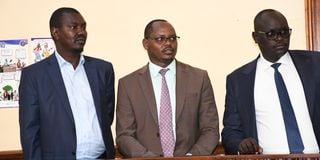Premium
Finland scholarship scandal: Here’s what went wrong

From left; Uasin Gishu Senator Jackson Mandago, county officials Joshua Lelei and Meshack Rono, during the hearing of the Sh1billion Finland Education Scholarship case at a Nakuru court on September 24, 2024.
A task force report filed in court has detailed the numerous challenges that plagued the rollout of the Uasin Gishu Finland/Canada Scholarship Programme, a scheme initially designed to offer students a chance to study abroad.
While the programme started with high hopes, it soon encountered financial mismanagement, shifting demands from partner universities, and visa complications that left many students and parents in distress.
According to the report chaired by former Deputy Governor John Barorot, part of the deal was for the universities to provide tailor-made programmes for students sponsored by the county.
Senator Jackson Mandago, then the governor, signed a Memorandum of Understanding (MoU) with universities in Finland and Canada, allowing students from the county to travel abroad for studies.
These universities agreed to accept students who would pay tuition fees for one term, with the rest to be paid as they continued working and studying.
Mr Barorot who testified in court on Tuesday, September 24, said embassies of the respective countries were also expected to expedite the processing of visas and other travel requirements through the Uasin Gishu Overseas Education Scholarship Programme.
The programme kicked off in 2020, and hundreds of students benefited after enrolling in various universities. However, by the end of 2022, the streets of Eldoret were flooded with protests after parents and students demanded refunds after failing to travel despite paying millions of shillings.
Testifying before Senior Principal Magistrate Alloys Peter Ndege, Mr Barorot explained how universities and embassies frustrated the programme by deviating from the initial agreements. He said the two parties came up with tough conditions that brought about confusion in the management of the programme which brought about controversy.
According to his report, the universities began demanding full payment of fees from individual students and blocked them from attending classes while threatening deportation.
"The universities shifted goals by demanding full-year fees plus pathway fees; initially, parents were required to pay first-semester fees only for students to travel,” Mr Barorot said.
In particular, Finland’s Laurea and Gradia universities demanded the payment of second-semester fees before students could travel. This left many parents unable to raise the required funds. As a result, the Uasin Gishu Overseas Education Trust had to use funds paid by other parents to cover the costs for students already abroad and facing deportation threats.
The task force also revealed that Sh 66 million paid by some students to the Trust Fund was transferred to cover other students' tuition.
“Parents of students already in Finland and Canada delayed and refused to pay fees for the subsequent semester. The county government transferred Sh 66 million from students still in Kenya to ensure those abroad were not sent back,” he testified.
On the other hand, some students, fearing deportation, moved to free vocational colleges, leading Finnish universities to terminate the programme for students still in Kenya.
Other hurdles arose when the Finnish Embassy changed visa requirements, demanding bank statements showing Sh 480,000 (later increased to Sh 960,000). Canadian parents were required to have bank statements showing a minimum of Sh 1 million and to pay full-year fees upfront.
Mr Barorot explained that initially students only had to pay the first-semester fees for visa approval and travel but the universities later terminated the MoUs.
Moreover, the total cost of studying abroad proved far more expensive than anticipated.
“The fee breakdown showed the programme was very expensive, with a degree costing approximately Sh 3.5 million and a diploma around Sh 2 million. Parents were not aware of this, leading to complaints of miscommunication by principal trustees,” Mr Barorot said.
Also, the mandatory pathway studies which parents were initially unaware of further added to the financial burden. The Canadian Embassy’s delays in visa processing also made it difficult for students to travel on time.
Mr Barorot noted that a significant portion of the Sh 100 million owed to parents was lost through overpayments, double payments, and payment errors, which the universities refused to refund. Out of the money traced using the student database, over Sh 17.13 million was identified as an overpayment to Canada for students who did not travel.
“Fees had been paid for a cohort of 48 students, but 14 did not travel because they did not qualify for the programme,” Mr Barorot said. The Trust erroneously paid Sh 8 million to Thompson River’s University instead of Sh 4 million, which was not recovered.
Following the challenges some of the parents in Keya who were yet to travel opted out of the programme and began demanding back their money.
“This caused panic and everyone started demanding back their money,” said Mr Barorot.
The taskforce, however, engaged the universities and managed to refund Sh 75 million to 125 parents by August 31, but 82 parents are still awaiting refunds.
Following the outcry, Senator Mandago was arrested alongside Mr Lelei and Mr Rono and charged with misappropriation of Sh 1 billion meant for the programme.
The hearing is ongoing with at least 27 out of 202 prosecution witnesses having testified.





